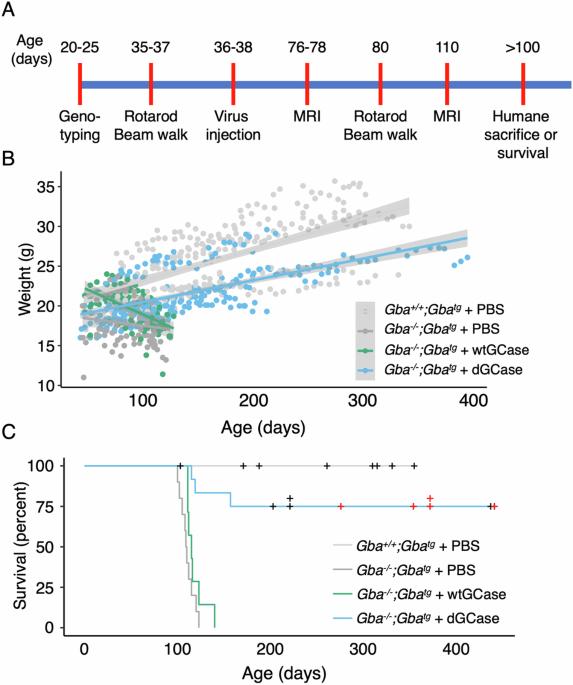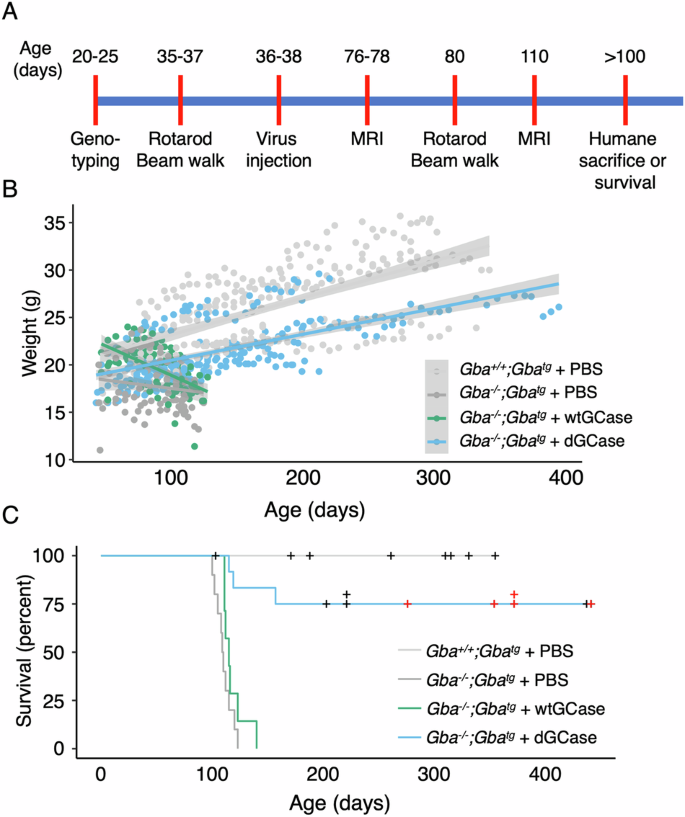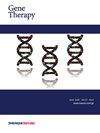Efficacy of an AAV vector encoding a thermostable form of glucocerebrosidase in alleviating symptoms in a Gaucher disease mouse model
IF 4.5
3区 医学
Q1 BIOCHEMISTRY & MOLECULAR BIOLOGY
引用次数: 0
Abstract
Almost all attempts to date at gene therapy approaches for monogenetic disease have used the amino acid sequences of the natural protein. In the current study, we use a designed, thermostable form of glucocerebrosidase (GCase), the enzyme defective in Gaucher disease (GD), to attempt to alleviate neurological symptoms in a GD mouse that models type 3 disease, i.e. the chronic neuronopathic juvenile subtype. Upon injection of an AAVrh10 (adeno-associated virus, serotype rh10) vector containing the designed GCase (dGCase) into the left lateral ventricle of Gba−/−;Gbatg mice, a significant improvement in body weight and life-span was observed, compared to injection of the same mouse with the wild type enzyme (wtGCase). Moreover, a reduction in levels of glucosylceramide (GlcCer), and an increase in levels of GCase activity were seen in the right hemisphere of Gba−/−;Gbatg mice, concomitantly with a significant improvement in motor function, reduction of neuroinflammation and a reduction in mRNA levels of various genes shown previously to be elevated in the brain of mouse models of neurological forms of GD. Together, these data pave the way for the possible use of modified proteins in gene therapy for lysosomal storage diseases and other monogenetic disorders.


编码恒温型葡萄糖脑苷脂酶的 AAV 载体在减轻戈谢病小鼠模型症状方面的功效
迄今为止,几乎所有针对单基因遗传病的基因治疗方法都使用了天然蛋白质的氨基酸序列。在目前的研究中,我们使用了一种设计好的葡萄糖脑苷脂(GCase)恒温形式(GCase是戈谢病(GD)中存在缺陷的酶类),试图减轻3型疾病(即慢性神经病变幼年亚型)模型GD小鼠的神经症状。将含有设计的 GCase(dGCase)的 AAVrh10(腺相关病毒,血清型 rh10)载体注射到 Gba-/-;Gbatg小鼠的左心室后,与注射野生型酶(wtGCase)的小鼠相比,体重和寿命都有显著改善。此外,Gba-/-;Gbatg 小鼠右半球葡萄糖甘油酰胺(GlcCer)水平降低,GCase 活性水平升高,同时运动功能明显改善,神经炎症减轻,以前在神经形式 GD 小鼠模型脑中升高的各种基因的 mRNA 水平降低。这些数据为在溶酶体贮积疾病和其他单基因遗传疾病的基因治疗中使用修饰蛋白铺平了道路。
本文章由计算机程序翻译,如有差异,请以英文原文为准。
求助全文
约1分钟内获得全文
求助全文
来源期刊

Gene Therapy
医学-生化与分子生物学
CiteScore
9.70
自引率
2.00%
发文量
67
审稿时长
4-8 weeks
期刊介绍:
Gene Therapy covers both the research and clinical applications of novel therapeutic techniques based on a genetic component. Over the last few decades, significant advances in technologies ranging from identifying novel genetic targets that cause disease through to clinical studies, which show therapeutic benefit, have elevated this multidisciplinary field to the forefront of modern medicine.
 求助内容:
求助内容: 应助结果提醒方式:
应助结果提醒方式:


